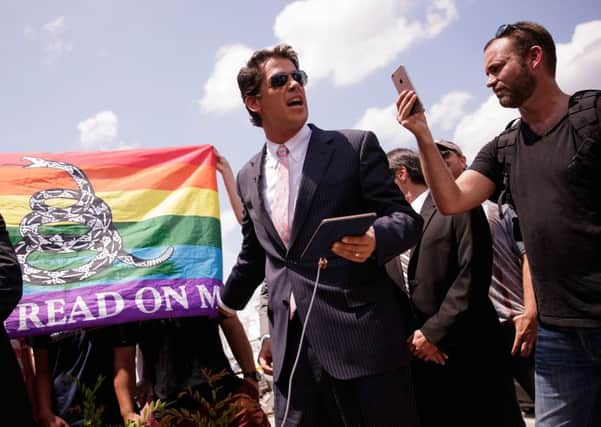Dani Garavelli: Should speech still be free in a post-truth world?


Weirdly, however, not everyone perceived the cringe-worthy exchange as a victory for Newman. Indeed, some men who doubtless frequent a self-validating corner of the internet, thought the triumph was all Yiannopoulos’s. “Milo did fantastic. Every single quote [Newman] used was taken so out of context, it’s obvious she was trying to smear him,” complained one. “Milo for [White House] press secretary,” crowed another.
This five-minute clash – so open to differing interpretations – encapsulates a dilemma broadcasters are struggling to get to grips with. Should they continue to give fringe zealots a platform from which to espouse invidious views?
Advertisement
Hide AdAdvertisement
Hide AdFor many years, news and political shows treated flamboyant contrarians like Yiannopoulos as useful clowns. They knew they would attract a crowd; that their outrageous opinions would draw gasps from the audience. But ultimately – so the logic went – they would show themselves for what they were: hate-filled buffoons, not to be taken seriously.
That was the BBC’s defence when BNP leader, Nick Griffin, appeared on Question Time in 2009; and it seemed to work. The audience booed and jeered him, he was exposed as a numbskull and his claims that the appearance would “propel the BNP into the big time” quickly crumbled.
But 2009 feels like a lifetime ago. Since then, we have watched as sections of the media turned Nigel Farage into a legitimate political force. Yes, it was inadvertent. I’m sure they thought, like Griffin, he would combust when exposed to oxygen. But instead his popularity grew. As he was normalised, so too were his party and his views, until audiences (and voters) stopped laughing and backed him all the way to Brexit.
The same phenomenon was repeated in the US. “Let Trump destroy himself with all his inflammatory nonsense,” the progressives said. By the time they realised his inflammatory nonsense was the zeitgeist, that his campaign existed in a fact-proof bubble and that no statement, however objectively toxic, could derail him, it was too late.
That Yiannopoulos is now in a position of quasi-power is largely due to the way he was feted and fawned over when he was a two-bit, click-bait Gamergate troll. Having helped to turn him into a cult figure, the media ought to be asking itself what it can do to reverse the process. Newman may have landed a few blows, but Yiannopoulos still had an opportunity to defend Breitbart headlines such as: “There is no hiring bias against women in tech, they just suck at interviews” and to air his views on the “grievance brigade”. Anyone who thinks his status won’t have been bolstered by that hasn’t been paying attention.
One of the tactics libertarians use most frequently against those who oppose hate-mongerers is to scream “freedom of speech” in the hopes it will sap their confidence. Last week, Brendan O’Neill (no fan of Yiannopoulos) accused the Stop Funding Hate campaign, which lobbies advertisers to withdraw their funding from right-wing newspapers, of censorship. “This is a sly, sinister effort to chill and tame the press,” he wrote in the Spectator. Of course, it’s nothing of the sort. It’s a group of people exercising their democratic right to raise awareness of migrant-baiting and xenophobia. It has no power, beyond that of persuasion, to make advertisers act and advertisers are no more duty-bound to underwrite bigotry, than shoppers are duty-bound to buy Christmas presents at tax-avoiding Amazon. In addition, there are bona fide questions over whether freedom of speech should extend to the freedom to misinform, as newspapers have over migrants (and as Trump did to secure power).
You only have to recall (as journalist Martin Belam has pointed out) that O’Neill previously wrote in praise of Gamergate, to suspect that his support for the principle is not born of conviction, but is rather a means of ensuring the voices of privileged white men continue to drown out everyone else’s.
Discussions on freedom of speech are never easy. Whether it’s the cartoons of Charlie Hebdo or a visit from self-styled pick-up artist Roosh V that are under discussion, it’s tough to strike an appropriate balance between the right of one group to speak their mind and the right of another not to be harassed. We can also tie ourselves in knots trying to establish the point at which efforts to oppose intolerance, become, in themselves, oppressive.
Advertisement
Hide AdAdvertisement
Hide AdIt would be foolish to think the media could ignore the right-wing bampots as they insinuate their way into Trump’s cabinet. But the old strategy – of allowing them to discredit themselves – has spectacularly backfired, so journalists need to think carefully about their decisions: about who is given a platform, in what context, and about how any such interviews are conducted.
We need to think about the way we frame the debate; the language we use. For example, does using the term “alt-right” – which was not common currency before the presidential campaign – help popularise the movement and its objectives? We also need to properly scrutinise any suggestion that our opposition is trampling on freedom of speech before yielding to it.
Think pieces claiming that “ the liberal community” is to blame for Trump’s rise are overstated. But given our failure to prevent it, it is incumbent on us to review our tactics for opposing far-right propaganda and make sure we are in better shape to challenge whatever comes next.